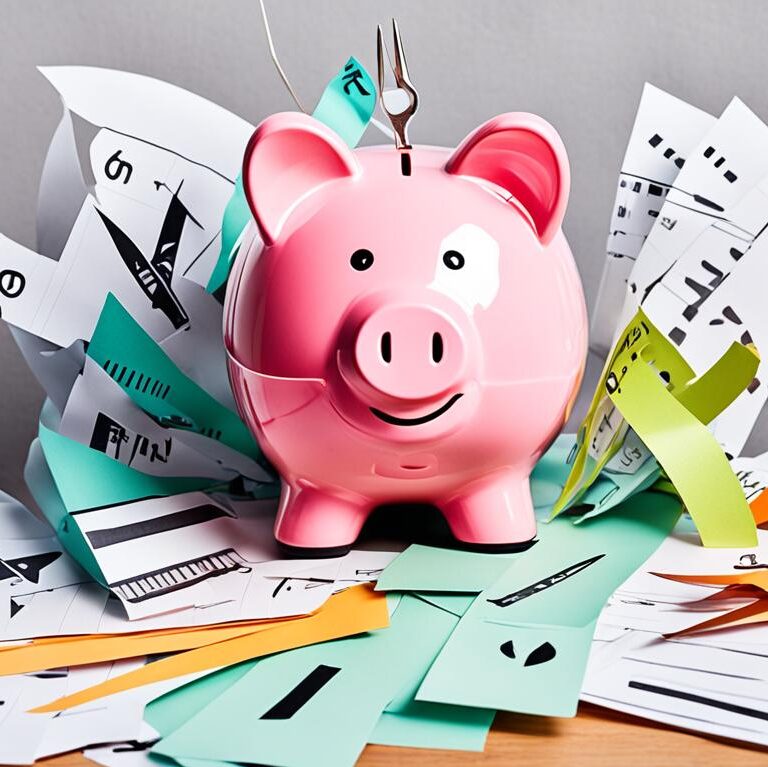“As an Amazon Associate I earn from qualifying purchases.”
Imagine you’re sailing smoothly through life’s financial waters. Then, dark clouds gather, and a recession looms. You might worry, “Will my financial ship stay afloat?” Don’t panic. With smart money management and financial planning, you can ride out any storm.
The U.S. economy is like a rollercoaster, full of ups and downs. Remember the 2008 crisis? It lasted 18 months. But, most recessions are shorter, averaging just 10 months since World War II. So, even though things seem tough now, better days are coming.
Your savings are key to getting through tough times. Many Americans have seen their savings drop since the pandemic. But, it’s not too late to start building your safety net. Aim for three months of expenses in your emergency fund. If you’re the main breadwinner or work in a shaky field, aim for six months.
If you’re retired, aim for a year’s worth of cash. It’s your financial umbrella for rainy days. Remember, recession-proofing isn’t just about saving. It’s also about smart spending, wise investing, and having a solid plan.
Key Takeaways
- Build an emergency fund of 3-6 months’ expenses
- Consider debt consolidation to manage rising interest rates
- Stay invested through market turbulence for potential rebounds
- Create a financial plan with different scenarios
- Remember, recessions are temporary and average 10 months
Understanding the Economic Landscape
The U.S. economy is facing big challenges with high inflation and strong Federal Reserve actions. It’s important to understand how these issues affect your money.
Defining Recession and Its Impact
A recession means the economy is getting worse over time. It affects things like GDP, prices, and how people feel about the economy. Companies sell less, leading to job cuts and high unemployment.
Investments like stocks and real estate also drop in value. This can hurt your retirement and savings.
Current Economic Indicators
There’s a 64% chance of the economy getting worse by the end of 2023. Interest rates are going up to fight inflation, which might lead to a recession. Gas prices near $5 per gallon show the economy is under stress.
Most workers worry about a recession more than other issues like wages, Covid, or job cuts. These signs point to a tough economic future.
Preparing for Financial Challenges
To handle economic ups and downs, check your finances and make a budget. Save money for emergencies, aiming for 3-6 months of living costs. Pay off debts first, especially for rent, cars, and student loans.
Keep an eye on your money, update your professional network, and look for extra work. Being ready is crucial for dealing with economic downturns.
“In the face of economic uncertainty, knowledge and preparation are your strongest allies.”
Revisiting Your Financial Goals
When the economy slows down, it’s time to check your financial plans. In uncertain times, setting clear goals is key. Let’s see how to make your goals fit the current economic situation.
First, look at your money closely. Check your income, spending, and debts. This helps you plan your finances better. In a recession, focus on being stable and secure.
Short-term goals might change. Here are some new priorities:
- Building an emergency fund
- Paying off high-interest debts
- Cutting non-essential expenses
For long-term plans, think about how to get through tough times. This could mean finding more income or investing in areas that do well even when the economy is down.
Good budgeting tips during recession can keep you on course. The 50/30/20 rule is helpful: 50% for must-haves, 30% for nice-to-haves, and 20% for saving or paying off debt.
| Financial Goal | Pre-Recession | During Recession |
|---|---|---|
| Emergency Fund | 3 months’ expenses | 6 months’ expenses |
| Debt Repayment | Minimum payments | Accelerated repayment |
| Investments | Growth-focused | Stability-focused |
| Major Purchases | Planned | Postponed |
By updating your financial goals, you’re taking a smart step towards stability. Stay flexible and ready to adjust as the economy changes.
Creating a Recession-Proof Budget
When the economy is shaky, having a budget that can stand up to a recession is key. Let’s look at some budgeting tips that can help you stay afloat.
Identifying Essential vs. Discretionary Expenses
First, sort your expenses into must-haves and nice-to-haves. Must-haves are things like your home, food, and bills. Nice-to-haves are things like going out, eating at restaurants, and buying things you don’t really need. This way, you can see where you can cut back if you need to.

Implementing the 50/30/20 Rule
Experts suggest the 50/30/20 rule for managing money well. Use 50% of your income for must-haves, 30% for nice-to-haves, and 20% for saving or paying off debt. This method keeps you ready for tough times while still letting you enjoy life.
| Category | Percentage | Example Expenses |
|---|---|---|
| Necessities | 50% | Rent, groceries, utilities |
| Wants | 30% | Entertainment, dining out |
| Savings/Debt | 20% | Emergency fund, retirement, loans |
Tracking Expenses with Digital Tools
Use technology to keep an eye on your spending. Apps and software can track your spending, set limits, and show where you can cut back. They give you up-to-date info on your finances, making it easier to tweak your budget as needed.
By using these budgeting tips and digital tools, you can make a strong financial plan for tough times. Remember, keeping an eye on your budget and making changes as needed is crucial for financial stability in the long run.
Building and Maintaining an Emergency Fund
When times are uncertain, saving money is key. Having an emergency fund can shield you from sudden financial problems. Let’s look at how to create and keep an emergency fund during tough economic times.
It’s wise to save for at least 4 months of living expenses. This fund can help you survive if you lose your job or face other financial hurdles. Begin by saving a little each week or month. Use extra money like tax refunds or bonuses to grow your fund faster.
Where should you store your emergency cash? High-yield savings accounts are a good choice because they offer easy access and earn interest. Right now, some accounts give up to 3% interest. For more interest, think about Certificates of Deposit (CDs) with rates around 4%. I bonds also offer nearly 7% interest.
| Savings Option | Current Interest Rate | Accessibility |
|---|---|---|
| High-yield Savings Account | Up to 3% | High |
| Certificate of Deposit (CD) | Around 4% | Medium |
| I Bonds | Nearly 7% | Low |
Your emergency fund should be easy to get to. In a recession, use these savings instead of selling investments or retirement accounts. By saving and focusing on your emergency fund, you’ll be ready for economic ups and downs.
Strategies for Reducing Debt
Reducing debt is key to good financial planning, especially when the economy is down. Let’s look at some ways to pay off your debt and boost your financial health.
Prioritizing High-Interest Debt
Start by paying off debts with high interest rates, like credit card balances. This can save you money over time. In fact, 30% of Americans are focusing on credit card debt to get ready for economic changes.
Exploring Debt Consolidation Options
Debt consolidation can make managing your money easier. Think about getting a single loan with a fixed rate to cover several high-interest debts. This could make your payments easier to handle and might lower your interest costs.

Negotiating with Creditors
It’s okay to talk to your creditors. Many are open to helping you, especially when times are hard. You might be able to get lower interest rates or payment plans that are easier to manage. This can help you deal with debt better during uncertain economic times.
| Debt Reduction Strategy | Potential Benefit |
|---|---|
| Prioritize High-Interest Debt | Save money on interest payments |
| Debt Consolidation | Simplify payments, potentially lower interest rates |
| Negotiate with Creditors | Possibly secure lower rates or modified payment plans |
Remember, paying off debt is a big part of good financial planning. By using these tips during a recession, you can aim for a more stable financial future. Stick to your debt reduction plan, and you’ll be ready for economic ups and downs.
Diversifying Income Sources
In uncertain economic times, having different income sources is key for financial stability. The impact of recessions on people can be tough. It’s vital to look for extra ways to make money. This way, you have a backup plan for tough times.
Side gigs are a great way to earn more. You can do freelance work or sell things online. The gig economy is full of chances for extra cash. For example, consulting can pay well if you know a lot about a certain topic.
Planning your finances is important for making the most of side gigs. Here are some steps to follow:
- Assess your skills and interests
- Research market demands
- Set realistic income goals
- Allocate time efficiently between your main job and side gigs
- Track your additional income and adjust your budget accordingly
Diversifying your income not only makes you more secure financially. It can also open up new career paths. When the economy goes up and down, having many income sources helps you keep your standard of living.
“Having additional income sources beyond a full-time job can contribute to enhanced financial security during a recession.”
By adding side gigs to your financial plan, you’re getting ready for a more stable future. This strategy helps you deal with economic downturns and prepares you for growth when things get better.
Budgeting Tips During Recession
During a recession, making smart financial moves is key. Cutting costs and living frugally can help you stay afloat. Let’s look at some budgeting tips to keep your money in check.
Cutting Non-Essential Expenses
First, cut non-essential spending. Look over your monthly bills and cancel unused subscriptions. Cooking at home instead of eating out can also save a lot of money.
Finding Deals and Discounts
Be a smart shopper by looking for deals and discounts. Use coupon apps, compare prices online, and join loyalty programs. Every saved dollar helps with your financial stability.
Embracing Frugal Living
Living frugally doesn’t mean you have to give up things you enjoy. It’s about making smart choices. Use public transport, find free fun, or start a garden. These habits save money and can make life better.
| Frugal Living Strategy | Potential Monthly Savings |
|---|---|
| Cooking at home | $200 – $300 |
| Using public transportation | $100 – $200 |
| Free entertainment options | $50 – $100 |
| Cutting unnecessary subscriptions | $30 – $50 |
By following these budgeting tips during a recession, you can stretch your budget. Small changes in spending can greatly improve your financial health.
Smart Investing During Economic Downturns
Economic downturns can be tough, but they also offer chances to make smart investments. To make the most of these times, you need to be cautious yet strategic. Let’s look at some top investment strategies for economic ups and downs.
Spreading your investments is crucial to reduce risk. In tough times, some sectors do better than others. Healthcare, utilities, and consumer goods stocks often do well. Adding these to your mix can help.
ETFs are a great way to diversify. They let you invest in many industries or assets with one investment. ETFs focused on metals like gold and silver are good choices, as they tend to do well when the market is slow.
Value investing is also a smart move. Look for companies with low debt, strong cash flow, and a solid market presence. These signs often mean they’re stable and could grow even when times are tough.
“Every recession so far has been succeeded by a recovery, which hasn’t always been significant or prompt.”
Dollar-cost averaging can lower the risk of investing at the wrong time. This method means investing the same amount regularly, no matter the market’s state. It’s a good strategy during unstable times.
| Investment Strategy | Benefits | Considerations |
|---|---|---|
| Sector Diversification | Spreads risk across different industries | Requires research on sector performance |
| ETFs | Offers broad exposure with single investment | May have management fees |
| Value Investing | Focuses on potentially undervalued stocks | Requires careful analysis of company financials |
| Dollar-Cost Averaging | Reduces impact of market volatility | May miss out on sudden market upswings |
Your investment choices should match your financial situation, how much risk you can handle, and your long-term goals. It’s wise to talk to a financial advisor. They can help craft an investment plan that fits your needs during economic downturns.
Protecting Your Credit Score
Your credit score is key in financial planning, especially in a recession. Keeping a strong credit score gives you the flexibility to get loans and better terms when times are tough.
Importance of Maintaining Good Credit
A good credit score opens doors to financial opportunities. It helps you get loans, rent apartments, and even find jobs. In hard economic times, a strong credit score is even more valuable.
Strategies for Improving Credit Score
Improving your credit score takes effort and smart money habits. Here are some tips:
- Pay bills on time, as payment history is the most important factor in credit scoring
- Keep your credit utilization ratio below 30%
- Maintain old credit accounts to lengthen your credit history
- Regularly check your credit report for errors
- Avoid applying for new credit too frequently
Avoiding Common Credit Pitfalls
It’s easy to make credit mistakes in a recession. Avoid these common errors:
- Maxing out credit cards
- Missing payments
- Closing old credit accounts
- Ignoring your credit report
Your credit score shows your financial health. By following these tips and keeping good credit habits, you can protect your financial future, even when times are uncertain.
| Credit Score Range | Category | Impact on Financial Options |
|---|---|---|
| 300-579 | Poor | Limited credit options, high interest rates |
| 580-669 | Fair | More options, but still unfavorable terms |
| 670-739 | Good | Better rates, more credit products available |
| 740-799 | Very Good | Excellent rates, preferred by most lenders |
| 800-850 | Exceptional | Best rates, terms, and credit products |
Seeking Professional Financial Advice
When the economy is uncertain, getting advice from a financial advisor can really help. These experts offer tailored financial plans to guide you through hard times. They can help you make a budget that stands strong during a recession and give you tips on managing your money wisely.
Financial advisors know a lot about personal finance. They can review your investments, help you manage debt, and improve how you save. This helps you get ready for when the economy slows down.
“A financial advisor can help you create a tailored plan that accounts for various economic scenarios, potentially saving you from costly mistakes.”
Here’s how a financial advisor can help you in tough times:
- Develop a customized financial plan
- Provide strategies for debt management
- Offer investment advice suited to market conditions
- Help build and maintain an emergency fund
- Guide you through complex financial decisions
| Service | Benefit |
|---|---|
| Personalized budgeting | Optimize spending and saving |
| Investment strategy | Mitigate risks during market volatility |
| Debt management | Create a plan to reduce high-interest debt |
| Retirement planning | Ensure long-term financial security |
While getting professional advice is great, it’s also important to learn and take part in your financial choices. Use a financial advisor’s advice to improve your financial knowledge and feel more confident about your money decisions.
Conclusion
Planning your finances during a recession is key to staying strong financially. By using budgeting tips, you can handle tough times better. Remember, recessions don’t last forever, averaging 10 months in the U.S. since World War II. With 74% of Americans worried about a recession, you can take steps to protect your money.
Start by making a budget that matches your income with your needs. Try to save 15% of your pre-tax income for retirement and have an emergency fund for 3-6 months of expenses. Look into high-yield savings accounts and consider investments like 401(k)s and Roth IRAs. When the economy is down, getting advice from a financial advisor can guide you.
Keep an eye on economic signs like GDP and Federal interest rates. Even if experts argue about if we’re in a recession, focus on making your finances stronger. Cut back on things you don’t need, find more ways to earn money, and handle your debt well. Your efforts in planning your finances now will help you stay strong in the long run.
FAQ
What is a recession, and how can it impact my finances?
How can I revisit my financial goals during a recession?
What strategies can I use to create a recession-proof budget?
Why is it important to have an emergency fund during a recession?
How can I reduce debt during a recession?
Why is it beneficial to diversify income sources during a recession?
What cost-cutting strategies can I implement during a recession?
How should I approach investing during a recession?
Why is it important to maintain a good credit score during a recession?
Should I seek professional financial advice during a recession?
“As an Amazon Associate I earn from qualifying purchases.”

